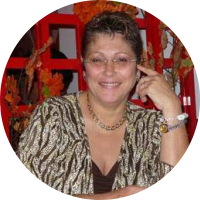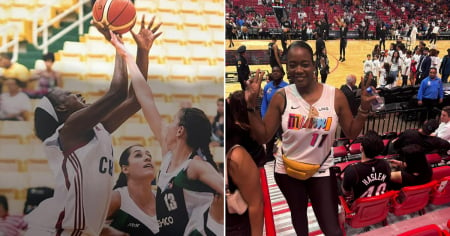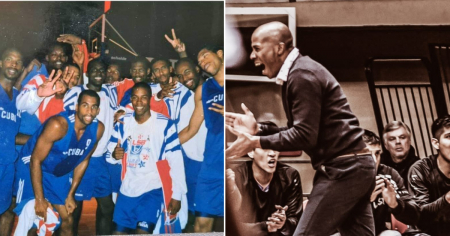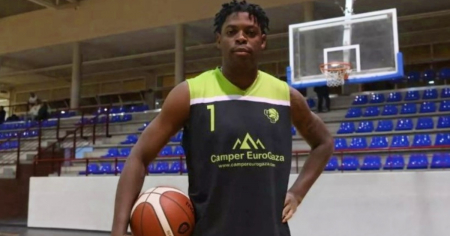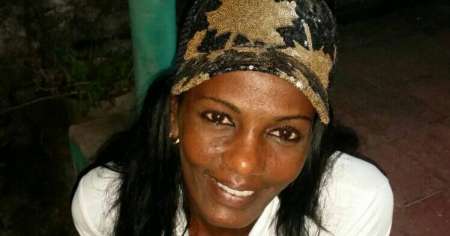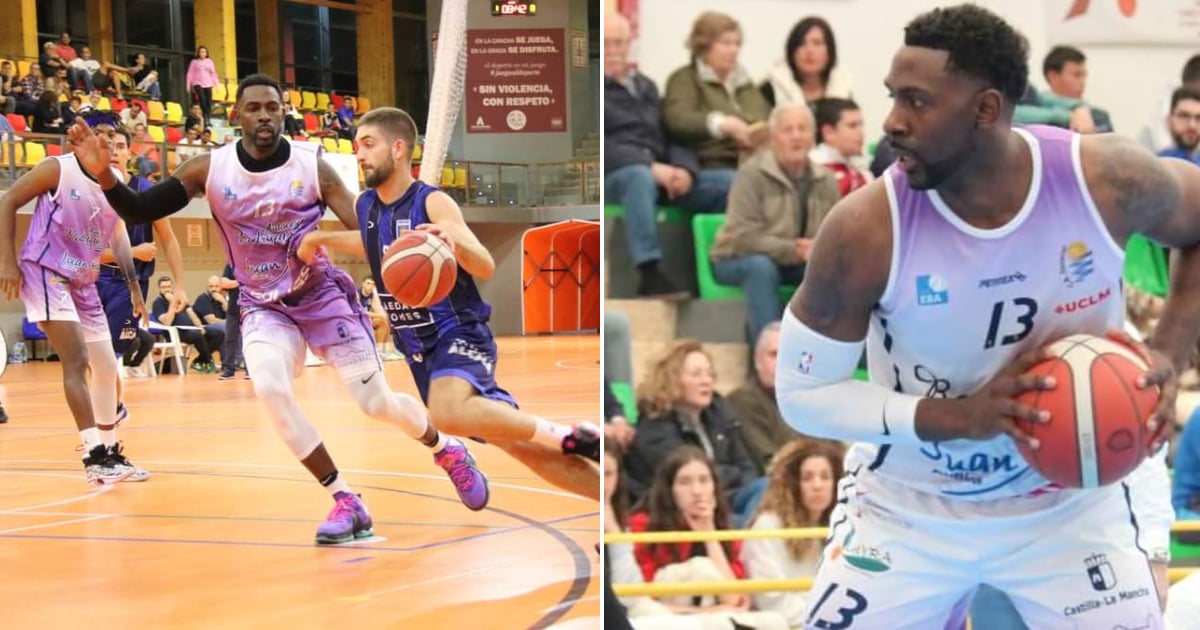
Related videos:
The “Rafael Castiello” hall in Guantanamo City was buzzing like water at over 100 degrees Celsius. Thousands of fans hanging from windows, towers, and even on the roof were passionately following the events of the Superior Basketball League.
Not without reason is it dubbed the Caldera de San Justo; many of the best players of the 2000s engaged in fierce battles here. Among them was Georvis Elias, a striking young man standing two meters tall and weighing 100 kilos, who, at 42 years old, still competes in the Spanish league of the sport of baskets.
Julita, believe it or not, I still play at the age of 42 with the Baloncesto Daimiel club in Ciudad Real, and I'm doing well, now with my 105 kilos of muscle, hahaha.
I left Cuba in 2009 to play a friendly match against the great Spanish team led by the Gasol brothers and others in Las Palmas de Gran Canaria. For me, it was always a one-way trip because I had already made up my mind… I wanted to be free!
And how has it been for you in Spain? How were you received on the Island?
In Gran Canaria, there is a large Cuban community, and from the very beginning, we were warmly welcomed. I'm speaking in the plural because you’ll remember that there were four of us: the forwards Georfry Silvestre and Grismay Paumier, and the point guard Taylor García. We felt right at home, so to speak.
And you're telling me that before you left, you had already made the decision to stay?
It was a decision made in Cuba between my brother Gato Silvestre and me. We were the ones who had been with the team the longest, and we were joined by two young players, Paumier and Taylor, as I mentioned.
Everything went well. At first, I was a bit nervous; you can imagine the drastic change in life: without your home, without your family, without your people, without your country, but never with regret. Just two weeks after arriving, the great Aroldis Chapman showed up, who had left the team in the Netherlands before the traditional Rotterdam tournament began.
How did he find you?
Because the news of our decision made a splash – and it really did! It became a media event: out of twelve players, four will remain in Spain.
They took a photo of us in a bar, and that's how Aroldis found us. He still didn't know his destination, and selflessly, he offered us his help. From the very first moment, he made everything easier for us. I will never forget that gesture, just like I won't forget the support from the boxer Yuriorkis Gamboa, who also stood by us. We spent months between Barcelona and Andorra until Aroldis left for the United States.
How have you managed to stay in shape?
Let me tell you: they call me the Guantánamo train because of my enviable physique—muscular and athletic. It’s true that I take good care of myself, but can you imagine who I would be right now in Cuba? Come on! Even superstars are forgotten there. I would be, at best, a coach at the EIDE in Guaso. Staying here has been the best decision of my life. I really take care of myself; I stay active with workouts and a good diet. I have everything I need.
Where do you currently live?
I have spent my entire professional career in Spain, and it has been difficult for me to leave. I’m the type of person who won’t move if I feel comfortable in a place. Currently, as I mentioned, I play for the Baloncesto Daimiel club and live in Ciudad Real, a town that is an hour and a half away from Madrid.
I have also played for the Albacete club in Castilla la Mancha, where I hold the record for the most points, rebounds, and assists. In fact, I have a jersey mounted on the wall of the court as a tribute to the best players. I spent four years with Albacete and have now been with Daimiel for five years.
When I decided to live in the Canary Islands, I played with teams from Lanzarote and Tenerife. In 2012, I was on the verge of joining the Gran Canaria team in the top division, but my paperwork as a Spanish citizen was not yet sorted out, and since I was occupying a foreign player spot, it was very difficult.
First steps, first court, first coach? Have you always been a basketball player?
My beginnings in Cuba date back to when I was 8 years old; I trained in the legendary San Justo boiler. My first coach, and the one I hold most dear, is named Antonio Martín, to whom I owe everything. I only practiced basketball, despite many failed attempts to turn my attention to volleyball.
Guantánamo is a province that loves basketball. Our players had their golden era in the 1980s when they became national champions in the top category three times. Additionally, when the Superior League was established, they formed a great partnership with the team from Santiago, giving rise to the Orientales, who provided many memorable battles, particularly against the Capitalinos.
Basketball was and remains the passion of many in my hometown; for me, I haven't put down the ball since I was 8 years old. It was played everywhere, and on top of that, we were lucky enough to watch college games and NBA matches—the best basketball in the world—on the naval base channel, which at that time reached all the televisions in the province.
All of that contributed to basketball getting into my veins like the blood you need to live. That's how I successfully participated in pioneer, school, and youth games. You can imagine how good I was that at just 15, still in my first year of youth competition, I was taken to a top-level tournament, and that was incredible.
Guantánamo had a very strong team featuring prominent figures from national basketball, led by Roberto "La Piedra" Simón, an outstanding center whom I hold in great esteem and who has always supported and advised me.
La Piedra is the father of that global volleyball powerhouse, Roberlandy Simón, who is currently a key player on the Cuban national team aspiring to qualify for Paris, giving it their all in the Nations League. But let's go back to the young Georvis.
I can tell you that I was the typical "kid" on the team back then, but an unexpected event, so to speak, occurred: while playing in the semifinals, if I remember correctly against Capitalinos (what an amazing team, I can't tell you anything you don't already know), there was a moment when several players had to leave due to foul accumulation, and Humberto Soler, who was doing really well, injured his wrist.
There was practically no other option: I stepped onto the court, and those minutes defined my recognition. I even played as a point guard despite being a forward. It was just a few minutes, wearing my "matanceros" sneakers, but I made an impression.
Later, I participated in my first National Youth Championship, and that was when I was promoted to the national ESPA team in Havana del Este. I stayed for two years, and at 18, I was called up to the national team at Cerro Pelado.
Georvis doesn't mention it out of modesty, which has always been one of his traits, but during those two years at the national ESPA, he greatly helped me by looking after my son Julito, a small, slender tennis player who was prone to being "the target" of the group. Nevertheless, the basketball players, with my interviewee today leading the way, were always there to watch over the smallest of my children... these are things one never forgets, right?
Georvis, how did it go for you at Cerro Pelado?
The journey wasn't easy, as we had to endure a difficult time. In 1999, we lost those giants of Cuban basketball, led by Lázaro Borrel, Ángel Oscar Caballero, and Roberto Carlos Herrera, may he rest in peace.
So, the generation that came after, to which I belonged, had to "pay the price." I joined the team in 2000, and it was all about training, training, and more training, without any international competition. Our sole objective was the Liga Superior de Básquet (LSB). Can you imagine?
I was at Cerro Pelado until 2009, and during that time, I was coached by Daniel Scott and Leonardo Pérez. I would have loved to have Miguelito Calderón as my coach, but he was no longer there.
To me, he was the best coach of that time. I know that with him, I could have taken my basketball to the next level; I don’t think he would have been bothered by trivialities like, “don’t grow a beard, don’t get tattoos, don’t wear that clothing,” which annoyed me so much back then.
Therefore, during those nine years in Cerro Pelado, not everything was rosy. Even though I got along well with everyone, including my teammates and coaches, I experienced many difficult moments. There was a time when if you didn't laugh with the coach or "suck up" to him, as we say here in Spain, you weren't in his good graces. I had to endure a lot, but thank God all of it helped me become who I am today... a free man!
Many times, when journalists go out to conduct interviews or reports, we set aside certain details. However, due to my affection for him, I learned about some of those issues that today can be shared more freely, but at that time, revealing them would have been detrimental to him. In short!
Did you always play as a small forward?
I have always played as a three; it’s the position I like the most, although I could also play in three positions: three, four, and five, meaning small forward, power forward, and center. Those who know me well understand what I mean. Now, I’m playing in the four and five positions; it’s what the team needs, and I'm here for it.
What are the major international events?
The greatest experience I had with the national team was at the Central American and Caribbean Games in Cartagena de Indias 2006 in Colombia. Although I did not step onto the podium, it was a blessing to be surrounded by the best athletes from Cuba.
What is your fondest memory of Cuban basketball?
Phew! Julita remembers that basketball and its LSB not only matched but even surpassed the National Baseball Series in terms of excitement. People were going wild, the venues were packed, and the fans were completely hooked; those were unparalleled moments. That Caldera de San Justo had people climbing on the roofs!
And when I stayed, I remember how fans would write to me saying they no longer wanted to watch basketball in Guantánamo. And it's true, my beloved Caldera de San Justo has never been filled again. The truth is, as I read the emails, tears would well up in my eyes.
Things have changed a lot now. Fortunately, players are signing contracts, either independently or through the Federation. That didn’t exist in my time; in addition to the lies we were told, as Silvestre and I are still waiting for the contract in Russia that we were promised.
At least now, although they may not all be the ones we would wish for, there are some who have been able to play abroad, thereby contributing to an improvement in our basketball and, of course, benefiting themselves as well.
Internally, it is indeed more challenging to hope for those intense days of great basketball to return because we all know that we are lacking many resources and perhaps even motivation. But this is our reality, and why not consider what we don’t have: transportation, food, accommodation, and the dismal conditions of the courts, including the backboards and basketballs.
How true your words are! Any wishes for the Cubans qualified for Paris?
Julita, I am a fan of my people from Cuba, regardless of the sport or the country they compete for. I will always wish them the best because I know the humble beginnings from which most of us come. In the Olympic Games, I will support all Cubans, no matter where they are competing.
Are you happy? Do you feel fulfilled?
Well, yes, on a personal level, I feel fulfilled. I’ve been able to pursue my career outside of Cuba. As I mentioned, I have my jersey hanging in a pavilion here in Spain, which, as you know, is something they do for legends.
Another dream come true was playing with a Cuban, in this case a fellow Guantanamero like myself, the guard Raudelis Guerra, who stayed behind during a stopover with the national team in Madrid almost three years ago. He was with me for two years, and now he is playing in Córdoba, Andalusia.
When is Georvis Junior coming?
Hahaha, soon! You will be the first to know. And as always, I appreciate that you haven't forgotten me. Say hi to Lolo (Julito) for me! Hahaha.
Filed under:
